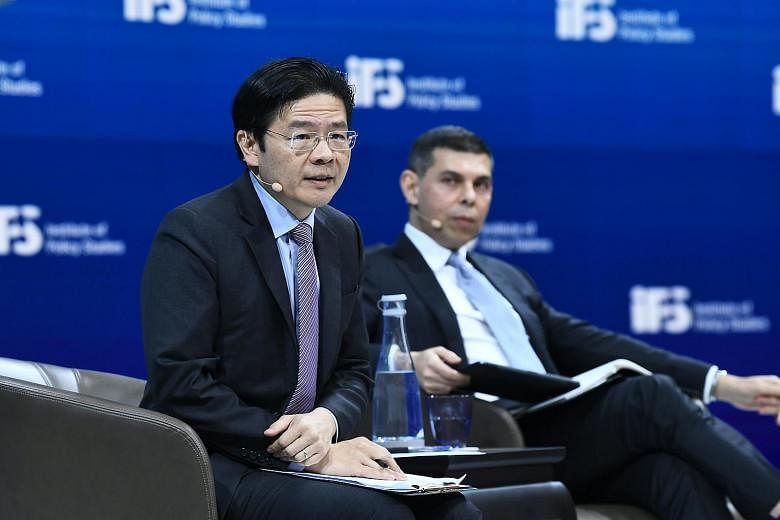When international investors and the broader global community think about having some presence in Asia, Singapore ought to be the first answer that comes to mind.
Education Minister Lawrence Wong yesterday expressed optimism for such a scenario in a post-Covid-19 future, but cautioned that Singapore's ability to gain relevance as a hub would also depend on it responding well to the ongoing coronavirus situation.
He was speaking at a dialogue chaired by Straits Times editor Warren Fernandez, as part of the Singapore Perspectives conference organised by the Institute of Policy Studies.
Mr Fernandez, who is also editor-in-chief of Singapore Press Holdings' English, Malay and Tamil Media Group, had noted that the pandemic-precipitated trend of remote work meant that international corporations could engage employees anywhere in the world, leading to implications for Singapore's hub status.
But Mr Wong, who is also Second Minister for Finance, said that some form of physical presence would still be needed in a "new normal".
"We are not going into a world where it's all just machines, and we stop having face-to-face interaction," he said. "It has not happened across human history and it's unlikely to happen going forward because... humans are fundamentally social animals."
He alluded to the same point earlier when noting that a fully work-from-home model was not doable.
"You cannot function effectively without that human collaboration… you do need a chance for people to come together," he said.
But neither should things go back to the way they were, he added, urging employers to embrace more flexible, hybrid arrangements blending face-to-face and remote work.
Mr Wong later stressed, in response to a question from the audience, that Singapore was in a far better and stronger position to fight Covid-19 today.
He pointed to improved testing and tracing capabilities and "more importantly", the vaccination programme now under way.
"That's a game changer," said Mr Wong, who also co-chairs the multi-ministry task force on Covid-19. "No doubt there is uncertainty with supply, but we have done our best to procure as much as we can. So what we need to do really is to tide through from now until the point when everyone in Singapore is vaccinated."
He also sought to address concerns about the high number of imported Covid-19 cases in recent days.
"We have not increased our travellers coming into Singapore," Mr Wong explained, adding that the two largest sources of travellers are construction workers - to fulfil contractors' needs - and foreign domestic helpers who perform caregiving duties for Singaporeans.
He said numbers have gone up because the prevalence and incidence rate of the disease is higher now, with the virus raging in countries everywhere. Mandatory pre-departure tests for travellers are also not foolproof as the virus may be incubating, leading to negative results for arriving persons who later test positive.
Hence the need for precautions such as a stay-home notice requirement to isolate them from the community, said Mr Wong.
At the end of the dialogue, he was also asked by Mr Fernandez what made him so sure that Singapore could come out for the better in the wake of the pandemic.
For Mr Wong, the answer lay in the tremendous spirit and resilience of Singaporeans rallying together.
Acknowledging the surreal experience of the world coming to a standstill in facing what some have called the "crisis of a generation", he said he was fortunate to have had a front-row seat to how Singaporeans responded to the situation.
He singled out the outbreak in the migrant worker dormitories - "our darkest hour last year" - and how the public and private sectors came together to set up community care facilities in double-quick time.
"We said it would be impossible, but they made the impossible possible," said Mr Wong. "Sometimes, just a few people can change the course of history and change the trajectory in a crisis. This was one of those moments.
"That's why I say I don't speak lightly when I believe with conviction that Singapore can emerge stronger from this crisis."


